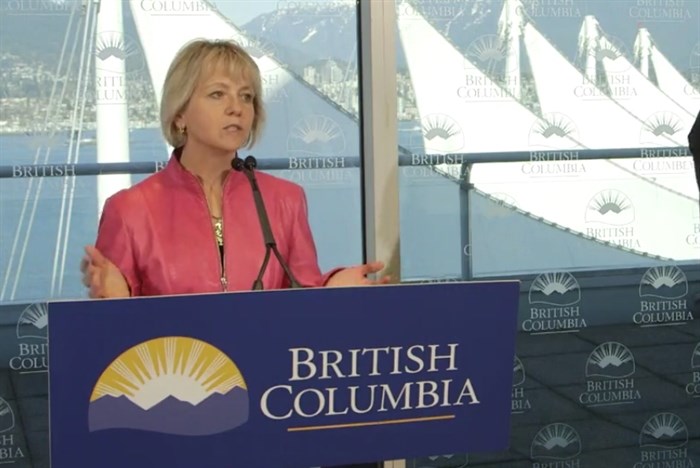
Provincial Health Officer Dr. Bonnie Henry speaking at a press conference March 18, 2020.
January 21, 2022 - 6:00 AM
As of today, Jan. 21, it has been two years since Provincial Health Officer Dr. Bonnie Henry and Minister of Health Adrian Dix held their first joint COVID-19 briefing.
That was four days before the first COVID-19 case was recorded in Canada – a man is his 50s who arrived in Toronto from Wuhan, China where the pandemic started.
Two days later, B.C. had its first positive case, also a man, this one in his 40s, who had returned to the Vancouver Coastal health region from Wuhan.
From the hoarding of toilet paper and the shutdown of the economy to the injection of the first COVID vaccines and Omicron, here's some of the things we lived through over the last very long two years of COVID-19.
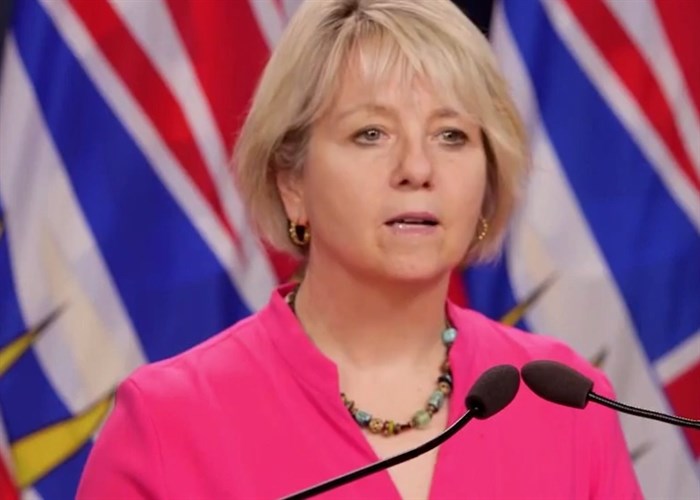
Dr. Bonnie Henry Jan.18, 2021.
2020
Jan. 25
First case in Canada
Feb. 3
Second case of COVID-19 in B.C.
Feb. 11
The World Health Organization announces COVID-19 as the name for the novel coronavirus disease.
Feb. 14
First COVID-19 case recorded in the Interior Health region.
Feb. 19
B.C. government announces the person with the first case of COVID-19 in the province has fully recovered.
Feb. 26
Federal Health Minister Patty Hajdu encourages Canadians to stockpile food and medication in case they or a loved one falls ill with the novel coronavirus.
March 2
Reports of shoppers loading up with toilet paper.
March 6
Stores across the Interior run out of toilet paper. Walmarts in Penticton, Vernon, Kelowna and Kamloops are completely sold out of face masks and hand sanitizer.
March 7
B.C. Government confirms COVID-19 cases at the Lynn Valley Care Centre in North Vancouver.
March 9
First COVID-19 death in B.C.
March 11
The World Health Organization announces COVID-19 can be characterized as a pandemic. There are 46 cases in B.C.
March 12
B.C. government says all gatherings over 250 people must be cancelled. Anyone returning to Canada must stay away from work or school for 14 days and Canadian government recommends against all non-essential travel outside of Canada. The NHL, WHL and the BCHL suspend their 2019-2020 hockey seasons.
March 14
More reports come in of supermarket shelves stripped bare of basic foods.
March 15
Silver Star Mountain Resort closes. Other resorts in the region follow suit over the following days.
March 16
Spring Break starts. The Government of Canada announces it is barring foreign nationals from all countries except the U.S. from entering Canada. B.C. dentists stop practicing.
March 17
B.C. declares a public health emergency. Dr. Henry uses the new powers and orders all bars and nightclubs closed. Social distancing becomes a thing as Dr. Henry announces people need to stay six feet apart. The cap on gatherings is lowered to 50 people. Province announces schools won't reopen after spring break.
March 18
B.C. declares a state of emergency. It is initially in effect for 14 days. Costco implements buying limits and social distancing rules.
March 19
The new normal starts to be seen as Kelowna's Orchard Park Mall is eerily quiet. There are 12 COVID-19 cases within Interior Health's region.
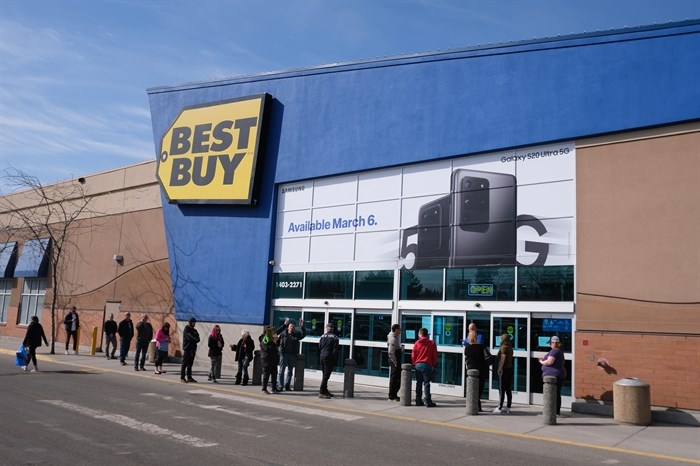
Customers line up outside of Orchard Park Shopping Centre in Kelowna after the province placed a limit on the number of people who could enter stores. Best Buy was one of the few stores in the mall to remain open during the spring lockdown.
(CARLI BERRY / iNFOnews.ca)
March 20
The City of Kamloops declares a local state of emergency. Dr. Henry orders the closure of all restaurants in the province. The Regional District of Central Okanagan shuts down playgrounds.
March 21
Dr. Henry orders all spas, salons and tattoo shops to close. Air Canada suspends flights which service the Kelowna and Kamloops Airports.
March 22
Some Interior supermarkets announce a $2 an hour pay increase for store employees.
March 23
B.C. Premier John Horgan announces one-off $1,000 payment for anybody unable to work due to COVID-19. The premier freezes B.C. student loan repayments until September and initiates deferrals for hydro and ICBC payments. Videos emerge of Vancouver residents on their balconies applauding hospital workers.
March 25
The Federal Government announces the Canada Emergency Response Benefit that will provide $2,000 a month for up to four months for workers who lose their incomes as a result of COVID-19. A repayment freeze on Canada Student Loans is put in place. A $500 rent subsidy is announced in B.C. There are 88 new cases reported in the last 24 hours, the highest number reported so far.
March 27
The Federal Government announces a 75 per cent wage subsidy to support small businesses. Food delivery services report massive uptick in business.
March 28
Provinces compile lists of essential services. Liquor and Cannabis stores, along with dry cleaners, make the B.C. list. A COVID-19 outbreak is declared at Bylands Nursery in West Kelowna after 14 temporary foreign workers test positive. As many as 63 workers were isolated until May 15.
March 29
Kelowna doctor reports 'critical shortage' of masks and PPE for healthcare workers.
March 31
The Canadian Federation of Independent Business reports 32 per cent of small businesses across the country have closed. B.C. health care facilities collect and sterilize disposable masks in an attempt to have an emergency supply if needed. The number of COVID-19 cases in B.C. tops 1,000.
March 31
The Interior Health region passes the 100 mark in COVID-19 cases.
April 1
B.C. visits to emergency rooms down 50 per cent.
April 4
Dr. Henry says B.C. “seeming to flatten our curve." There are 1,203 cases recorded in the province. The number of cases worldwide surpasses one million with more than 57,000 deaths.
April 7
No new COVID-19 cases reported in the province in 72 hours.
April 12
B.C. reports hunting licence sales have nearly doubled.
April 15
B.C. extends state of emergency for another two weeks. There have been 75 COVID-19 related deaths.
April 15
Interior Health region records its first COVID-19 death, a man in his 60s.
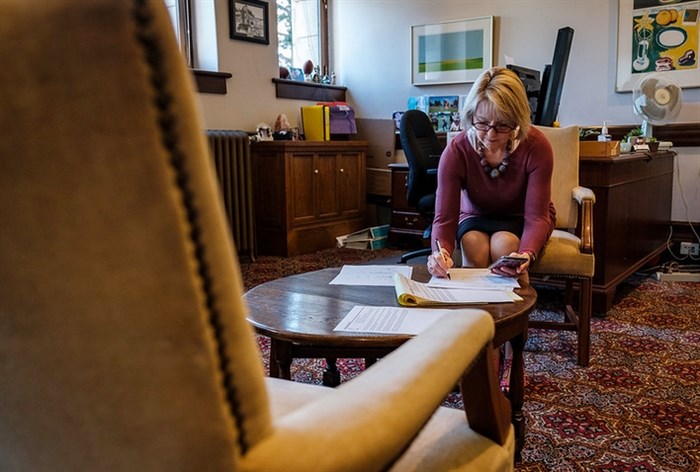
Dr. Bonnie Henry on April 18, 2020.
April 24
Two hundred pairs of a special $399 Dr. Bonnie Henry shoe designed by John Fluevog sell out as soon as they go on sale. Proceeds go to Food Banks B.C.
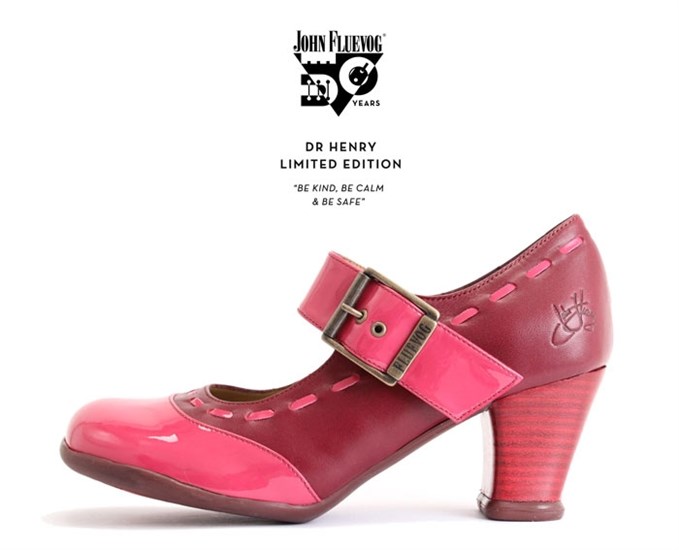
The Dr. Bonnie Henry shoe was a hit.
May 6
B.C. starts lifting COVID-19 restrictions on surgeries, parks, stores and haircuts.
June 1
School children return to school using a hybrid model for learning that combines in-class and remote learning.
June 24
Premier John Horgan announces that Phase 3 of B.C.’s reopening can start, meaning people are encouraged to travel within B.C. Hotels, movie theatres, parks and the film industry gradually re-opening. At that time, B.C. had recorded fewer than 3,000 cases.
July 1
Kelowna's Bernard Avenue is closed to traffic so restaurants can expand their patios onto the street.
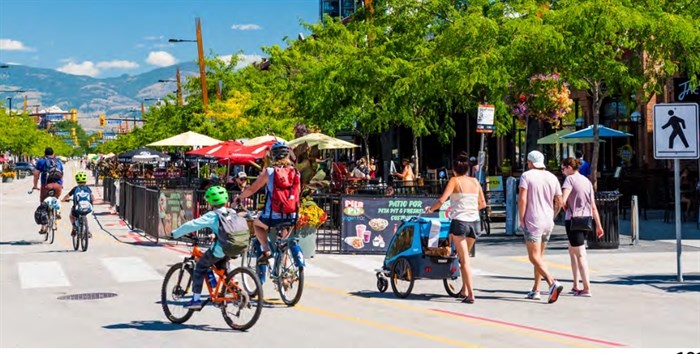
Pedestrian traffic was up 99 per cent on Bernard Avenue after it was closed to vehicles last summer.
July 13
After going five weeks with no more than one new COVID-19 case per day in the Interior Health region, new cases start to climb as the result of parties held in Kelowna around the July 1 holiday. That becomes known as the Kelowna Cluster and leads to at least 130 positive tests with hundreds more people going into self-isolation.
July 27
The Kelowna Cluster leads to Dr. Henry ordering a clampdown on the number of people who can be in rental accommodation and each unit is allowed only five visitors.
July 30
A UBCO students puts a magnetic notice board on his truck explaining why he has Washington licence plates following hostile reactions to out of province visitors.
Aug. 7
A woman has her Alberta licence plates stolen while stopping overnight in Kamloops.
Aug. 24
B.C. case total passes the 5,000 mark.
Sept. 8
Nightclubs and banquet halls ordered closed.
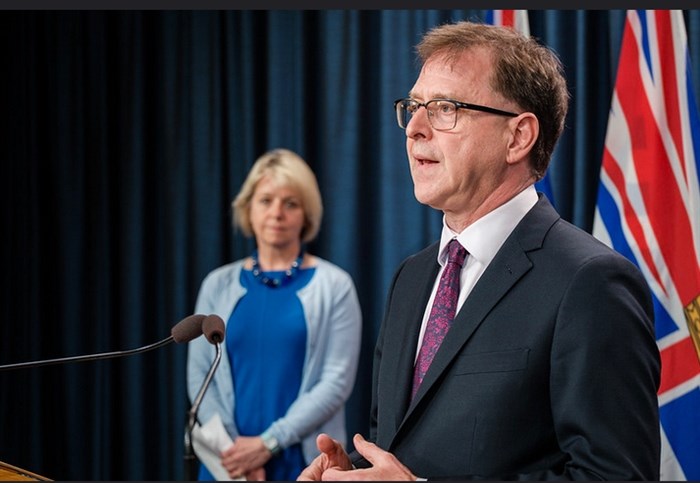
Adrian Dix and Dr. Bonnie Henry, Sept. 10 2020
Sept. 25
Outbreak at Calvary Chapel in Kelowna leads to seven cases.
Oct. 8
B.C. passes 10,000 COVID-19 cases.
Oct. 21
COVID-19 outbreak at École de l'Anse-au-sable elementary school in Kelowna forces the school to close for two weeks. That's followed by numerous "exposure" events in Interior schools, mostly in the Central Okanagan.
Oct. 22
B.C. sets a new record for the number of COVID-19 cases in a single day at 242. That record is broken repeatedly throughout the fall, peaking at 911 on Nov. 27.
Oct. 26
Visits to homes limited to six guests. Playdates for children are discouraged and wearing masks in public places is expected.
Nov. 7
Dr. Henry orders stricter socializing restrictions in the Lower Mainland. They ban indoor and outdoor social gatherings of any sort except with immediate household members and wearing face masks is mandatory in public spaces. She recommends all non-essential travel stop.
Nov. 13
The Interior Health region records its 1,000th case.
Nov. 19
The Lower Mainland restrictions are extended to the rest of B.C.
Nov. 26
A community cluster is declared in Revelstoke after 22 people tested positive for COVID-19. It was declared contained on Dec. 11 with a total of 50 cases.
Nov. 30
First resident of an Interior Health region long term care home diagnosed with COVID-19. It’s the first of many outbreaks in the region.
Dec. 2
Dr. Henry reports that a B.C. men’s hockey team travelled to Alberta and brought COVID-19 back with them.
Dec. 3
Dr. Henry bans adult team sports games.
Dec. 7
Lock down on socializing in B.C. extended for another month.
Dec. 8
B.C. announces a one-time, tax-free $1,000 per family B.C. Recovery Benefit.
Dec. 13
The organizer of a Kelowna protest against COVID-19 restrictions is fined $2,300 in Kelowna. More fines to come.
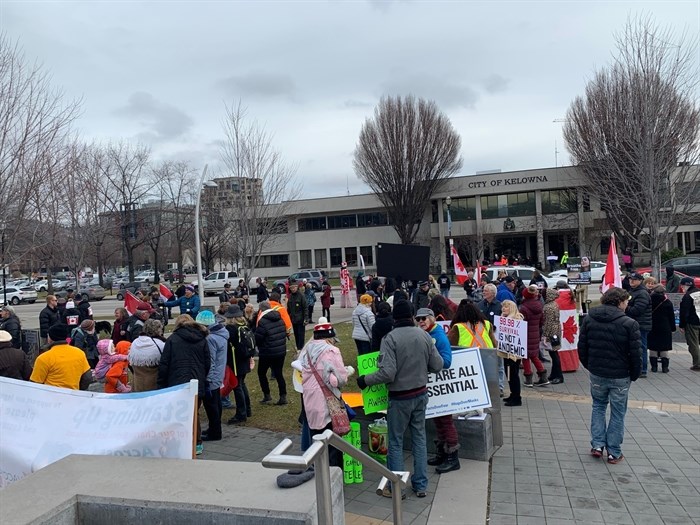
Rallies protesting COVID-19 restriction are held every Saturday in downtown Kelowna. The organizer has received two $2,300 fines.
(CARLI BERRY / iNFOnews.ca)
Dec. 14
Two employees at Big White Ski Resort test positive for COVID-19. That cluster grows to 203 by Jan. 19, 2021. Most are people who work and live on the mountain. Big White cancels reservations for out of region visitors.
Dec. 20
B.C.’s socializing restrictions over Christmas are some of the toughest in Canada.
Dec. 22
First COVID-19 vaccinations administered in Kamloops and Kelowna.
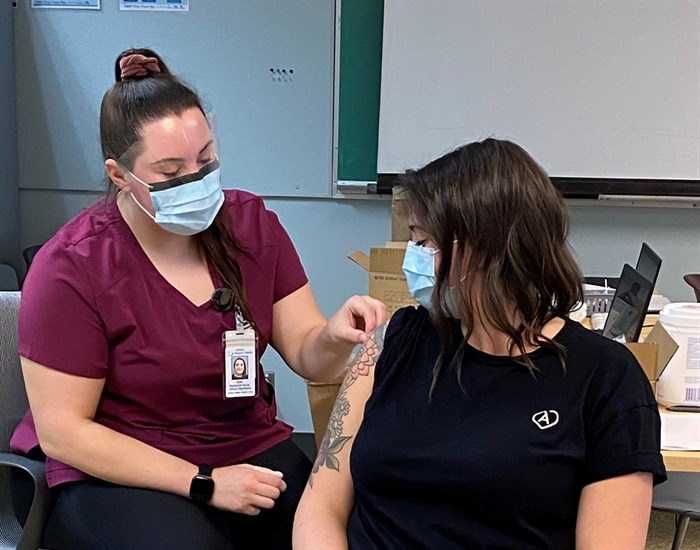
Kelsey Medhurst was the first COVID-19 vaccine recipient in Kamloops.
Dec. 23
Dr. Henry says B.C. is bending its COVID-19 curve
Dec. 27
First COVID-19 U.K. variant case found in B.C. Four cases of COVID-19 are reported amongst staff at Sun Peaks Ski Resort.
Dec. 28
B.C. has now recorded more than 50,000 cases.
Dec. 30
Dr. Henry bans liquor sales after 8 p.m. New Year's Eve until 9 a.m. New Year’s Day. That includes bars, restaurants and liquor stores.
2021
Jan. 7
COVID-19 restrictions on social contact extended to Feb. 5.
Jan. 11
Death toll at long term care homes in the Interior Health regions reaches 40.
Jan. 15
Interior Health passes the 5,000 mark in terms of total COVID-19 cases.
Jan. 18
Kelowna’s Harvest Ministries International church hit with its second $2,300 fine for holding in-person services. The church vows to take the province to court over its ban on religious gatherings.
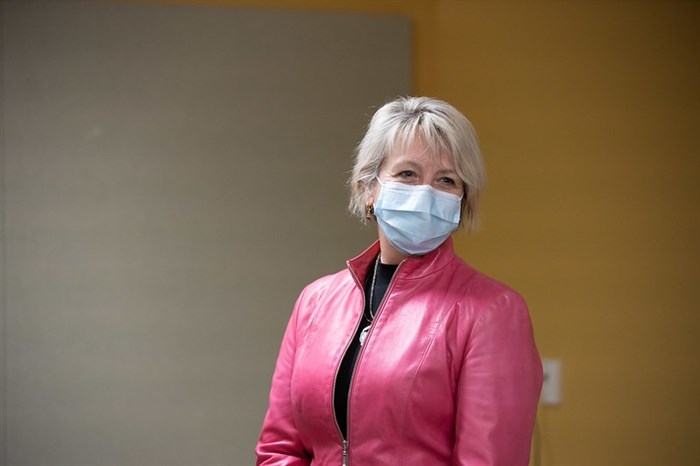
Dr. Bonnie Henry on Dec. 15, 2020.
Jan. 18
The COVID-19 outbreak at the McKinney Place long term care home in Oliver is declared over. It has been the worst in the Interior with 78 people, including 55 residents, infected and 17 people dying.
Jan. 20
B.C. has recorded 62,412 cases of COVID-19 and 1,104 deaths. In the Interior Health region, there have been 5,465 cases and 55 deaths.
Jan. 21, 2021
First anniversary of the first COVID news briefing by Dr. Henry and Dix.
Jan. 22
It’s announced that, in mid-March, people can start registering to get their first vaccine, based on age.
The first COVID outbreak in Royal Inland Hospital in Kamloops announced. It’s the first of many in both Royal Inland and Kelowna General Hospital
Jan. 23
Kelowna residents start counter-protesting against anti-COVID protests held every Saturday in City Park.
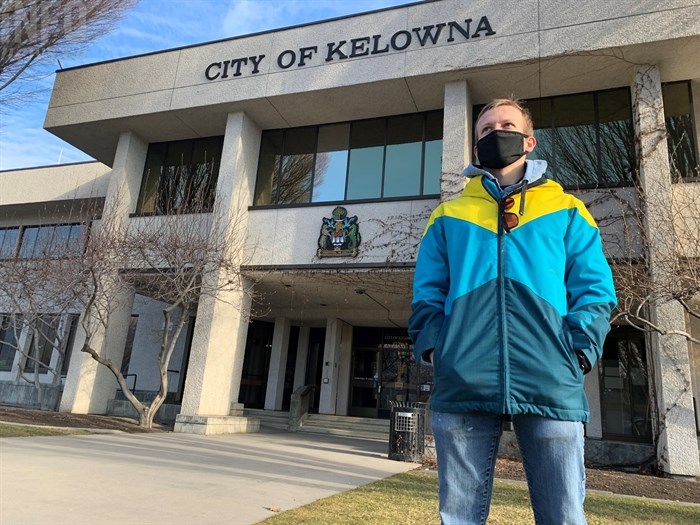
Reuben Scott, from Summerland who commutes to Kelowna for school, observes an anti-COVID-19 restriction protest in Stuart Park, Saturday, Jan. 23, 2021.
(CARLI BERRY / iNFOnews.ca)
Jan. 29
B.C. residents advised not to travel outside their home communities for non-essential reasons.
Feb. 1
The first variants of concern, from South Africa and the United Kingdom, are recorded in B.C. over the past few days.
Feb. 3
Case counts increase in COVID outbreaks in Royal Inland Hospital and numerous seniors housing facilities. Surgeries postponed at RIH.
Feb. 4
Masks made mandatory for middle and high school students.
Feb. 5
Mask mandates and a ban on socializing with people outside your own household extended to the end of February.
Feb. 13
More than 200 people attend “mega” anti-COVID rally in Kelowna’s Stuart Park. RCMP observe but don’t issue any tickets.
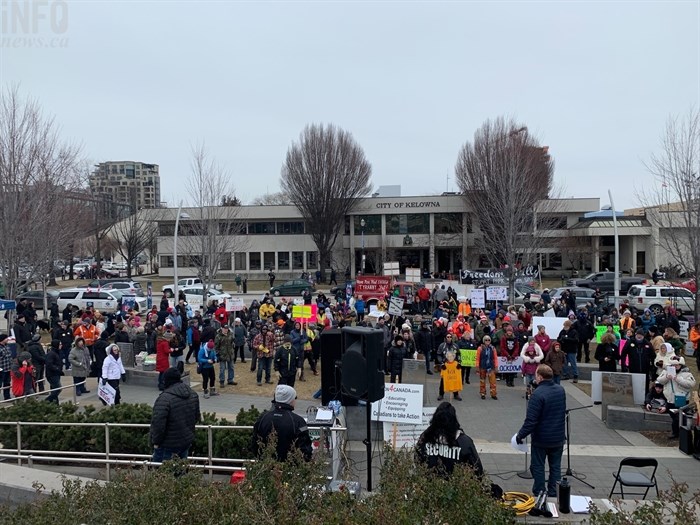
A protest against COVID-19 restrictions was held in Kelowna's Stuart Park, Feb. 13, 2021.
(CARLI BERRY / iNFOnews.ca)
March 1
B.C.’s vaccination program is in Phase 2, meaning those over 80 living in the community can get first doses. Phase 3 starts in April for those 75-79 and continues by age increments with those aged 60 to 64 expected to get their first doses in June.
March 11
Outdoor gatherings of up to 10 people now allowed.
March 14
As many as 250 rally outside the Harvest Church in Kelowna protesting restrictions on faith services. The church had already received several $2,300 fines for holding services contrary to public health orders.
March 23
Ban on outdoor faith services lifted.
March 25
Dr. Henry announces that indoor church services can be held from March 28 to May 13, with safety plans in place.
March 29
Indoor church services banned, as are gyms, fitness clubs and indoor dining in restaurants. Students in Grades 4 to 12 have to wear masks as COVID case numbers spike.
April 1
Visitors allowed back into long term care homes.
April 5
Houseboat party in Kelowna shut down as parties abound in the city of the Easter weekend.
April 8
Record high single daily count of new COVID cases in B.C. at 1,293.
April 10
Pharmacies start providing AstraZeneca vaccines.
April 12
Another downtown Kelowna rally, this time in favour of reopening churches, draws 200 protesters and no fines.
Those 40 and over now eligible for first vaccine shots.
April 19
Those over the age of 18 can start registering for vaccines.
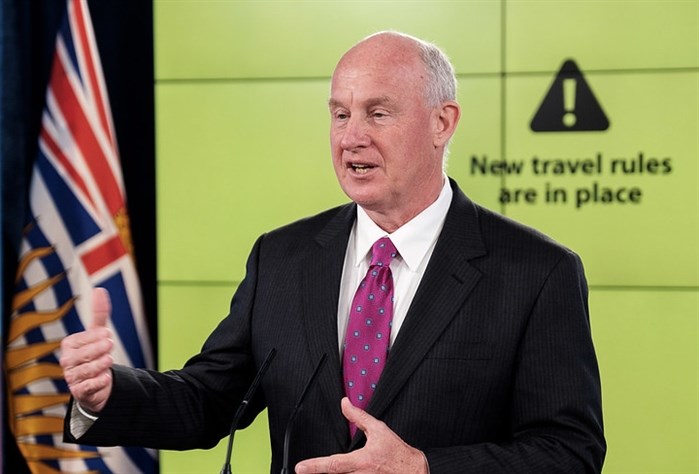
Minister of Public Safety and Solicitor General Mike Farnworth issues a new order using the extraordinary powers of the Emergency Program Act to prohibit non-essential travel between three regional zones in the province, using health authority boundaries, Friday, April 23, 2021.
Image Credit: SUBMITTED / Province of B.C.
April 23
Non-essential travel banned for B.C. residents between the Interior and Lower Mainland and between the Lower Mainland and Vancouver Island as COVID case counts and hospitalizations climb. Road checks are put in place.
Albertans can still travel into B.C.’s Interior and North but not to the Lower Mainland.
Kelowna’s Sun City Silver and Gold Exchange bans customers who are vaccinated or wear masks.
May 18
Masks now required at all times in B.C. fitness facilities, as well as other indoor spaces.
May 20
Children 12 and over can now register for COVID vaccinations.
May 23
More than 100 people were turned away for engaging in non-essential travel between the Interior and Lower Mainland on the May long weekend.
May 25
“Circuit breaker” COVID lockdown rules eased. Travel bans were lifted. Indoor dining establishments can serve liquor after 10 p.m., fitness classes can resume, outdoor sports leagues are back and people can return to working in offices. Mask wearing in indoor public spaces and physical distancing rules still apply.
Dr. Henry says she doesn’t expect B.C. will institute a vaccine passport system.
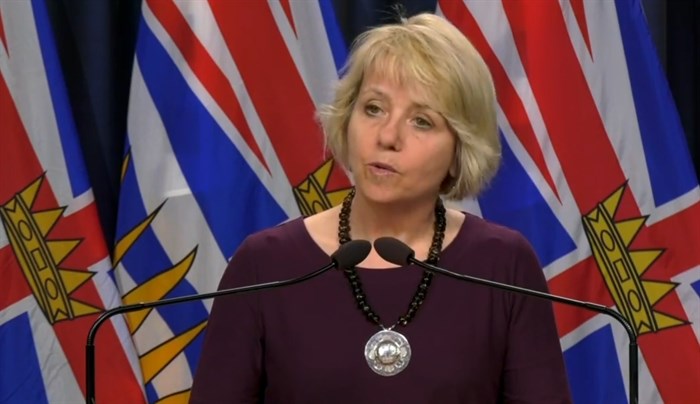
Dr. Bonnie Henry May 25, 2021.
Image Credit: FACEBOOK/BC Government
May 27
Residents over the age of 70 and those considered extremely medically vulnerable can start registering for second doses of COVID vaccines.
Faith based services can be held indoors with up to 50 people.
June 15
Further easing of COVID restrictions.
July 1
Most COVID restrictions removed as outdoor gatherings of up to 5,000 people allowed, limits are taken off the number of diners in restaurants but they still cannot socialize between tables, masks no longer mandatory indoors and recreational travel outside the province can resume.
July 13
Anti-vaxer protesting outside Kelowna vaccination clinic goes on a racist tirade against a security guard trying to get him to leave.
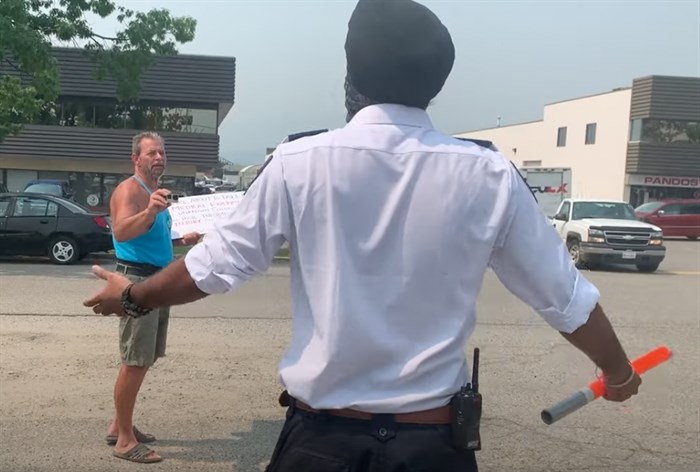
Kelowna protestor Bruce Orydzuk was seen yelling at Paladin Security guard Anmol Singh outside a Kelowna vaccination clinic, July 13, 2021. Singh received national praise for his calm manner in handling the protest.
(CARLI BERRY / iNFOnews.ca)
July 27
COVID case numbers start to climb with Interior Health leading the way, recording 95 of the 150 cases recorded in the province in the previous 24 hours.
July 28
COVID outbreak declared for the entire Central Okanagan so masks now required to be worn indoors, indoor organized gatherings are limited to 50 people and travel outside the region is discouraged. If businesses have three or more cases, they will be ordered to close.
The increase in cases came mostly from those not fully vaccinated and the Interior Health region lags behind most of the province on that count.
Aug. 6
Further restrictions ordered in the Central Okanagan, including the closing of bars and nightclubs, indoor personal gatherings are limited to five visitors and organized seated indoor and outdoor gatherings are capped at 50. Only six people are allowed at any one table at restaurants while alcohol service has to stop at 10 p.m. High intensity fitness programs are suspended and non-essential travel outside the Central Okanagan is not recommended.
Aug. 10
Some non-urgent scheduled surgeries cancelled at Kelowna General Hospital as it copes with an increase in COVID patients.
Aug. 12
All staff at B.C. long term care homes ordered to be fully vaccinated by Oct. 12.
Aug. 13
Record high number of daily cases in the Interior Health region with 376.
Aug. 20
Central Okanagan COVID restrictions expanded throughout the Interior Health region.
Aug. 23
Premier John Horgan announces the phased-in B.C. Vaccination Card, three months after Dr. Henry said a vaccine passport likely wouldn’t be introduced in B.C. Neither call the new card a passport.
Aug. 25
Masks made mandatory again for all indoor public spaces including for school children in Grade 4 and up.
Sept. 1
Booster doses of the COVID vaccines announced, starting with the elderly in long term care homes.
Massive anti-vaccine rallies outside Kelowna and Kamloops hospitals create problems for emergency vehicles along with a backlash from health care workers and the public.
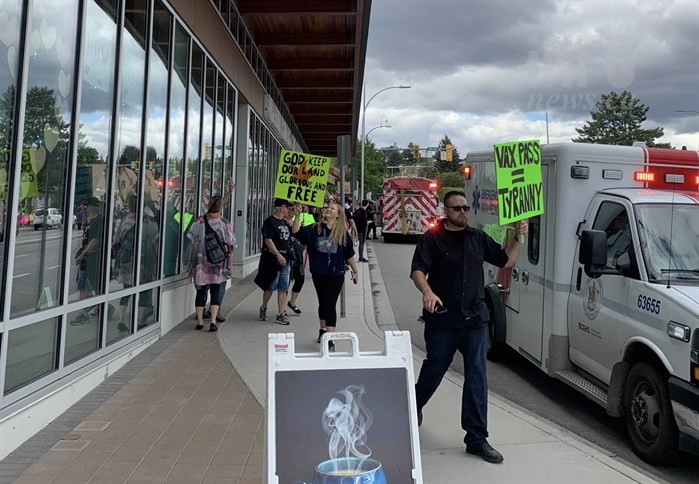
Anti-vax protestors are seen outside Royal Inland Hospital in Kamloops, Wednesday, Sept. 1, 2021.
(LEVI LANDRY / iNFOnews.ca)
Sept. 11
Royal Inland Hospital in Kamloops hires more nurses as it struggles under the double whammy of COVID and wildfires.
Sept. 13
With vaccine passports in place, the stricter COVID restrictions in the Interior Health region relaxed.
Workers in all B.C. health care facilities ordered to be fully vaccinated by Oct. 26.
Dozens gather outside the Interior Health office in downtown Kelowna to protest vaccine cards.
Royal Inland Hospital in Kamloops struggles at 117% capacity.
City facilities in Kelowna and Kamloops start requiring vaccine cards for entry.
Sept. 17
Anti-vaccine protesters enter Salmon Arm schools.
%%Image 20%%
Sept. 24
80% of B.C. residents now fully vaccinated.
Sept. 28
“Pandemic of the unvaccinated” is the new catchphrase but older, vaccinated people are disproportionately dying in the pandemic.
Oct. 4
All students in schools have to wear masks.
Oct. 5
Provincial government announces all its employees must be fully vaccinated by Nov. 22 as will all visitors to long term care and assisted living homes by Oct. 12. Visitors to acute care hospitals have until Oct. 26 to be vaccinated.
Oct. 12
Masks now required to be worn in all indoor public spaces by children aged five to 11.
Oct. 19
Sports events, weddings and concerts return to 100% capacity.
Oct. 20
City of Kamloops employees ordered to be vaccinated by Dec. 15. The City of Kelowna follows with the same rule a few days later.
Oct. 26
All B.C. residents eligible for a COVID booster shot six to eight months after their second dose.
Deadline for health care workers to get vaccinated is reached, with 7% of Interior Health workers not vaccinated, the highest rate in B.C. Non-urgent surgeries postponed in Kamloops and Kelowna to cope with staffing issues and high COVID counts.
Oct. 28
Coaches of children’s sports teams must be vaccinated.
Nov. 1
90% of B.C. residents now have at least one vaccine dose.
Nov. 3
More than 200,000 B.C. residents have been infected with COVID.
Nov. 10
COVID outbreaks in three Okanagan and Shuswap schools send hundreds of children home.
Nov. 11
Anti-vaccine demonstrators disrupt unofficial Remembrance Day ceremonies in Kelowna, Kamloops and elsewhere.
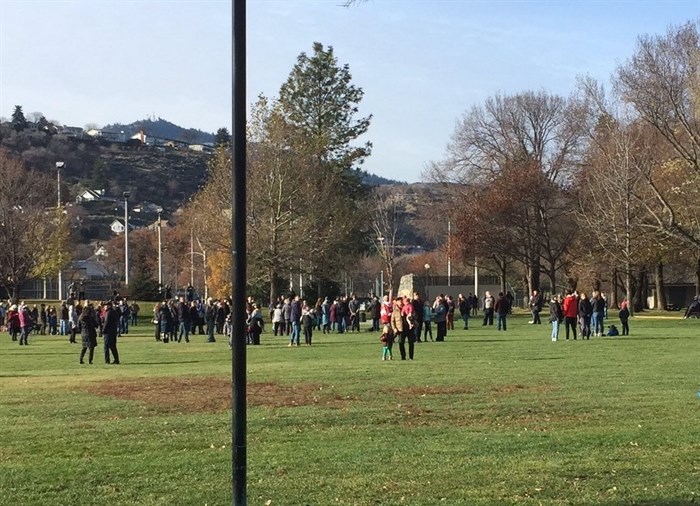
Jay Michi expected to attend a Remembrance Day event at Riverside Park in Kamloops on Nov. 11, 2021, but he discovered the unofficial event was a veiled anti-vaccine protest.
Image Credit: TWITTER/Jay Michi
Nov. 15
Legislation introduced to create no-protest zones within 20 metres of health care facilities in B.C.
Nov. 19
Penticton craft brewery operator who announced he was going to defy orders to require patrons to be vaccinated was declared Business Leader of the Year by the Penticton Chamber of Commerce.
Nov. 23
Vaccines for children aged five to 11 start arriving in B.C.
Nov. 26
Omicron variant sparks travel ban to Canada from a select few countries. Omicron makes it to Canada anyways.
Nov. 30
International flights resume at Kelowna International Airport, long after some smaller Canadian airports got that right back after the global lockdown of air travel in 2020.
Stricter lockdown rules relaxed for the Interior Health region, such as indoor venues going to 100% occupancy.
Dec. 7
First five cases of Omicron appear in B.C.
Dec. 20
Rising Omicron case counts trigger new restrictions, including the cancellation of New Year’s Eve celebrations, limiting personal indoor gatherings to 10 people, venues with 1,000 or more seats limited to 50% capacity and everyone attending indoor events must be vaccinated. All sports tournaments and travel associated with them are cancelled.
Dec. 22
Bars, nightclubs, fitness centres and gyms ordered closed. Some gyms and fitness clubs defy the order and stay open.
Dec. 28
COVID rapid test kits become available in limited numbers in the Interior Health region.
Dec. 29
Schools ordered closed for an additional week, until Jan. 10, so COVID safety measures can be enhanced with things like staggered start and break times.
Dec. 30
Record high daily COVID case count for B.C. of 4,383 new cases, even though Dr. Henry says there are probably three to four times that many people getting COVID each day.
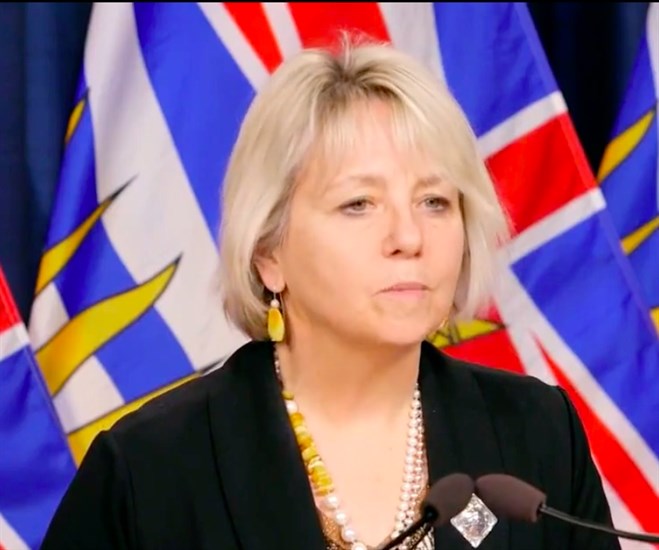
Dr. Bonnie Henry, Jan. 18,, 2021.
Image Credit: Flickr/Government of B.C.
2022
Jan. 1
Only essential visitors allowed into long term care homes and those sick with COVID who have mild symptoms can self-isolate for only five days after their symptoms resolve. It was 10 days before.
Jan. 11
Five anti-vaccine protesters arrested and 43 fined during a “Mask Free Monday” protest inside Superstore in Kamloops.
Jan. 12
Interior Health records its highest ever single day tally at 534 new cases, although the real number of cases is probably three to four times higher.
Jan. 14
Dr. Henry announces that Omicron cases have peaked and it’s on a downward trend, at the same time saying there are likely three to four times as many cases of COVID in the community that what is announced in the province’s daily counts. That’s because people have been told not to get tested if they’re younger and don’t have serious symptoms. Others get rapid tests and don’t report positive results to health authorities.
The counting method of how many people are in hospital with COVID changes to include everyone with a positive test result. That bumps the tally up but the rate of hospitalization for COVID is expected to continue to grow for a week or so after daily case count peaked.
Dr. Henry says B.C. is a “step closer” to the pandemic’s end.
Jan. 18
COVID restrictions extended to until at least Feb. 16.
A new health order will allow school districts to legally require staff to declare their vaccine status.
Health Canada's approves Pfizer's antiviral COVID-19 treatment.
The vaccination rate for those of all ages with at least one dose of a COVID vaccine is 86% but it's only 81% in Interior Health. Enderby has one of the lowest vaccination rates in the province at 74%.
Jan. 19
Even though the end of the pandemic is “one step closer” Dr. Henry warns that Omicron is still a serious disease with one in 10 who get it being sick for 12 days and many people, especially those over 70, will need treatment in intensive care units and some people, of all ages, will die.
COVID death toll passes the 2,500 mark with 2,505 now dead, including 307 in the Interior Health region.
There are more than 35,000 active cases on a daily basis in B.C., including 5,769 in Interior Health, where 46,372 residents have had confirmed cases.
The vaccination rate for people over the age of 12 is 92.4% with at least one dose, 89.7% with at least two doses and 35.5% with three doses.
Jan. 20
Gyms and fitness centres re-open.
To contact a reporter for this story, email Rob Munro or call 250-808-0143 or email the editor. You can also submit photos, videos or news tips to the newsroom and be entered to win a monthly prize draw.
We welcome your comments and opinions on our stories but play nice. We won't censor or delete comments unless they contain off-topic statements or links, unnecessary vulgarity, false facts, spam or obviously fake profiles. If you have any concerns about what you see in comments, email the editor in the link above.
News from © iNFOnews, 2022